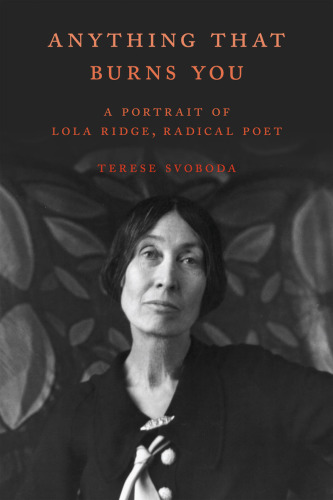
Anything That Burns You
A Portrait of Lola Ridge, Radical Poet
کتاب های مرتبط
- اطلاعات
- نقد و بررسی
- دیدگاه کاربران
نقد و بررسی

November 16, 2015
In this dense and heavily researched tome, poet and fiction writer Svoboda (A Drink Called Paradise) resurrects the fascinating life and work of Lola Ridge. She was recognized at her death in 1941 as “one of the leading poets of America,” but is now unread. Ridge, an Irish immigrant who lived in New Zealand and Australia before coming to the U.S. at age 34 in 1907, became a fixture of the modernist movement. Svoboda illuminates Ridge’s friendships with Marianne Moore, Emma Goldman, and others, as well as her mentoring of writers such as Hart Crane and Jean Toomer, and her involvement in left-wing causes, including the Sacco-Vanzetti trial. A lively, nuanced, and complex portrait emerges of a Communist sympathizer, feminist, and anarchist who abandoned her child and two consecutive husbands to pursue artistic freedom while speaking in a “searing voice” for the marginalized and oppressed. Svoboda nearly overwhelms Ridge’s own story with descriptions of almost every writer and artist she encountered. Still, amid all the detail, one can grasp the psychology and ambition of a talented, driven woman for whom “art and activism were one” and who deserves remembrance not just as “a fulcrum for modernism” but as a premier poet in her own right.

October 15, 2015
A passionate defender of the poor and oppressed receives a full-length biography. Poet, essayist, and editor Lola Ridge (1873-1941), born in Ireland, raised in New Zealand, and educated in Australia, made her mark in the United States beginning in 1907, when she became part of a burgeoning arts scene in San Francisco, and most significantly in New York, where she was a major literary figure. Svoboda (Tin God, 2013, etc.), a poet, fiction writer, translator, and Guggenheim Fellow, revives Ridge's life in minute--sometimes fascinating, sometimes tedious--detail. Possibly because she was denied access to archival sources, Svoboda speculates about Ridge's motivations, thinking, and assumptions: "perhaps," "could have," and "might have" recur so often that they become distracting. Although providing context is one of the author's strengths, at times she overdoes it. For example, while recounting the time when Ridge deposited her 8-year-old son in an orphanage, where he remained for six years, Svoboda offers many examples of others who abandoned their children. Ridge's admiration for Percy Bysshe Shelley generates a list of other admirers, including Oscar Wilde, Karl Marx, George Bernard Shaw, and Upton Sinclair. Ridge suffered from "an illness similar to T.B.," leading Svoboda to note a handful of others in her circle who "spent enormous amounts of time in bed." More relevant are capsule biographies of everyone Ridge knew: her friends Marianne Moore, novelists Evelyn Scott and Kay Boyle, activists Margaret Sanger and Emma Goldman; Harold Loeb, who assigned Ridge as American editor of his literary magazine Broom; Jean Toomer, Robert McAlmon, Matthew Josephson, and scores more. Svoboda's close reading of Ridge's poetry supports Boyle's assessment that Ridge "expressed a fiery awareness of social injustice" in "a woman's savage voice." Anorexic, living in self-imposed poverty, uncompromising, and strong-willed, Ridge merged the political and the literary as she helped to shape modernist aesthetics. A revealing, though at times overly detailed, portrait.
COPYRIGHT(2015) Kirkus Reviews, ALL RIGHTS RESERVED.

February 15, 2016
Anarchist, poet, activist, and feminist Lola Ridge (1873-1941) is not widely known or read in literature classrooms, though she once enjoyed success during her lifetime. Svoboda (When the Next Big War Blows Down the Valley) has created the first full-length biography of Ridge, rendering an important and well-documented read that traces Ridge's development as a poet. Ridge began writing poetry at a young age and is most recognized for The Ghetto and Other Poems (1927), which charts the difficulties of the immigrant experience. Born in New Zealand, Ridge lived there until she moved to Australia in 1903. Within four years, she would relocate to San Francisco and then to New York where she worked for anarchist Emma Goldman. Throughout this amazing story, Svoboda weaves elements of Ridge's life, including her political activism, with her poetry. The author's extensive research is revealed through notes and a lengthy bibliography of archival, Web, and print sources. VERDICT Discovering Ridge's work and life will be a delight for readers of women authors, feminism, and poetry, especially those interested in activist writers.--Stacy Russo, Santa Ana Coll. Lib., CA
Copyright 2016 Library Journal, LLC Used with permission.

























دیدگاه کاربران